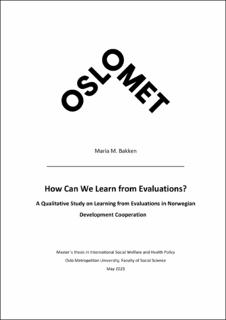| dc.description.abstract | This thesis seeks a fundamental understanding of the connection between evaluations and learning in Norwegian development cooperation through four objectives shaped by a literature review. The objectives are to identify and analyze; 1. Attitudes towards the usefulness of evaluations of development cooperation. 2. How methodological considerations in evaluations can affect learning. 3. How evaluations are believed to be necessary for changes within Norad. 4. How attitudes towards evaluations may be affected by organizational factors. Previous research points out interesting factors that inhibit learning from evaluations from different angles. This thesis adds perspectives from inside development cooperation to explain their professional learning experiences. The analysis and discussion utilize a synthetic theoretical view based on evaluation methods (Weiss) and organizational learning loops (Argyris & Schön) because the views supplement each other in coverage of the research objectives. Future research on the topic would benefit from including theoretical perspectives that further explain the dynamics between research and policymaking in the theoretical perspective.
Data collection consists of eight semi-structured interviews, with different staff in Norad and one researcher. The thematic analysis shows that learning from evaluations is connected to four overarching themes. The themes concern; 1. Attitudes Towards Evaluation Methods. 2. Organizational Factors. 3. Political Influences. 4. Evaluation Utilization.
The findings show that professionals care about evaluation quality; if they find this lacking, they will be less open to learning. It is therefore essential to build cogent research to create organizational learning where staff can trust its findings. Evaluation research is impacted by degrees of objectivity and the involvement of external consultants, where negative experiences of this create less openness for learning. Dissemination strategies may be necessary for both learning and accountability, and this is dependent on individual practices rather than incorporated structures. Currently, there is no structure to support learning, and professionals find this problematic in practice. The findings present situations that primarily support single-loop learning from evaluations. Development cooperation should support further learning culturally and systematically, and such shifts must be prioritized in practice. | en_US |
